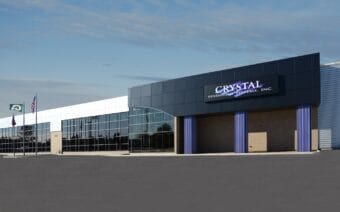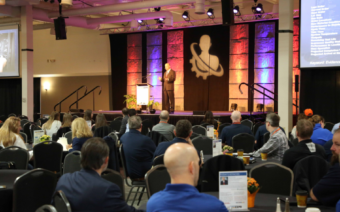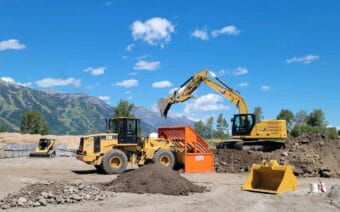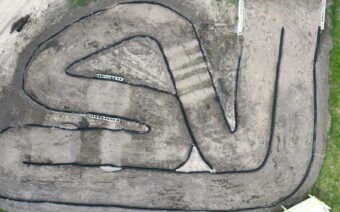
June 10, 2024
WAUPACA – When it comes to sustainability, Rob Johnson – executive vice president of administration, CFO and treasurer for Waupaca Foundry – said even the little things matter.
One initiative, plus another initiative, plus another – pretty soon, Johnson said, the small things add up.
“We have to do a bunch of little things, and together, those little things will make big results,” he said. “We have several initiatives – whether it’s recycling water within our plants, reusing the energy from the heat we use for our cupolas or using our sand 30 times before it’s used for another beneficial reuse – there are a lot of things that go into sustainability. We’re not perfect, but striving toward perfection is the goal.”
As one of the biggest foundries in the State of Wisconsin and beyond, Johnson said Waupaca Foundry takes it upon itself to do what it can to support the industry – especially in terms of moving the dial forward with sustainability practices.
“Being the largest foundry, I feel we have a responsibility to lead by example…,” he said. “It’s the right thing to do.”
The most recent of those efforts, Johnson said, was the foundry’s involvement in getting a law changed, which has oftentimes hindered the industry’s transportation capabilities.
The law – 2023 Wisconsin Act 156 – he said, changes weight and length limits on vehicles transporting metallic or nonmetallic scrap.
So, what does this mean, and why does it matter?
“The law allows Waupaca Foundry and other state foundries to transport more raw pig iron to its facilities using fewer truckloads,” Johnson said.
Before this law was passed, Erik Ellingson, Waupaca Foundry General Counsel, said there were restrictions on the amount of scrap metal that could be transported on Wisconsin roads – in Waupaca’s case, pig iron.

“The distinction resulted in a negative impact on the environment, with extra, wasteful truck loads to accomplish the same hauling task,” he said. “The new act reduces the number of trucks needed to haul, which will, in turn, reduce emissions.”
The foundry, Johnson said, saw significant costs and load increases over the last several years due to former regulations.
- 2020 – 294 additional loads (at a cost of $512,075)
- 2021 – 314 additional loads (at a cost of $559,722)
- 2022 – 281 additional loads (at a cost of $502,093)
Being able to eliminate some of these costs, Johnson said, allows the foundry to remain competitive – especially on a global scale.
Ellingson said the updated law eliminates confusion over what a recyclable metal material is.
Pig iron, Johnson said, is a manmade product that combines various scrap materials into a smaller, more compact product used in iron castings.
He said it is purchased overseas and shipped north from the Port of New Orleans to a holding site in La Crosse before being trucked to one of its four Wisconsin foundries.
Johnson said Waupaca Foundry estimates the new law will reduce roughly 300 truckloads and offset rising logistics costs.
How we got here
The bill was co-authored by State Rep. Kevin Petersen (R-Waupaca) and State Sen. Joan Ballweg (R-Markesan), but Johnson said Waupaca Foundry had a hand in the process from the beginning.
Johnson said the ball, sort to speak, began rolling when Ballweg visited the foundry a couple of years ago.
“One of the things we had brought to her attention at that time was, ‘look, we’ve got this law in place that doesn’t make sense,’” he said. “Not only was it costing us a lot of money, but at the time, we had a shortage of truck drivers, and here we were putting 300 additional loads on the road per year when it’s this interpretation of a rule that wasn’t defined.”
That, Johnson said, got Ballweg’s attention and work on getting the law changed began – which eventually garnered the support of Petersen.
He said the process, though admittedly long, gave him and the foundry the opportunity to work with lawmakers to bring about change for the industry.
“It was the first time I had been involved in a process like this, so it was exciting from that point of view,” he said.
One of the things Johnson said he appreciated the most about the process is “their willingness to listen.”
“The process showed me you can work with the lawmakers – you just have to tell them your story, explain the issue and help them understand,” he said.

Johnson said once all parties had an understanding of why a law change was warranted, “it was then a matter of going through all of the different steps to get the bill passed.”
Johnson said he testified in front of the Senate in support of the bill in October 2023 – as did the Wisconsin Manufacturers & Commerce.
“Waupaca Foundry does great work for our community, and it’s always a great day when we can cut bureaucratic red tape for businesses in Wisconsin,” Petersen said.
As a competitor in a global market, Johnson said, Waupaca Foundry must do what it can to eliminate any barriers that exist, and “working with lawmakers is one of those ways we can reduce barriers.”
“Every barrier isn’t necessarily something the government controls,” he said, “But when there are instances where the government has an influence to help mitigate those roadblocks, I think it’s important to get those lawmakers on board to help them understand the whys.”
More than just cost benefits
Though decreasing its transportation costs by $500,000 a year is a significant impact – “that’s a lot of dollars” – Johnson said it isn’t the only reason Waupaca pushed for and supported the law change.
2023 Wisconsin Act 156, he said, also has noteworthy impacts on the sustainability focuses of the foundry.
“Having that many fewer loads on the roads is a significant impact,” he said.
Looking at the big picture, Johnson said advocating for the law change is another step in Waupaca Foundry’s journey to becoming net zero by decreasing greenhouse gas emissions in all facets of its production.
Focusing on a net-zero mission since 2001, he said Waupaca is one of the few foundries in the nation taking active measures to reduce its carbon footprint.
With those goals in mind, Johnson said the foundry is constantly reinvesting in its facilities and practices to make them more efficient and environmentally sound.

“Waupaca Foundry is the largest iron metal caster recycler in the country – we recycle all the materials in our melt operations,” he said. “We already are a huge recycler, and this is an additional way we can help mitigate some of those other external aspects of the environment by reducing the truckloads and emissions.”
Johnson said the law also cuts down on the foundry’s labor needs – which is critical at a time
when many businesses throughout the country are struggling with labor shortages.
According to the National Association of Manufacturers, Wisconsin factories are responsible for 18.95% of the total economic output in the state, employing 16.76% of the workforce.
And though this law significantly impacts its operations, Johnson said it “eliminates barriers for other manufacturers operating in the state” as well.
“Manufacturing is essential to Wisconsin’s economy,” he said. “Being the largest foundry in the state, I think we own some of the responsibility of leading some of these initiatives.”
 Builds on the past, offers a glimpse into the future
Builds on the past, offers a glimpse into the future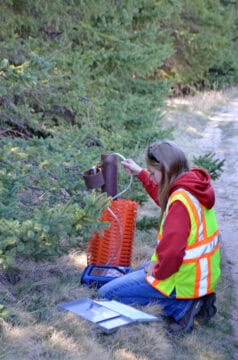 Ayres engineers 50 years in Green Bay
Ayres engineers 50 years in Green Bay


